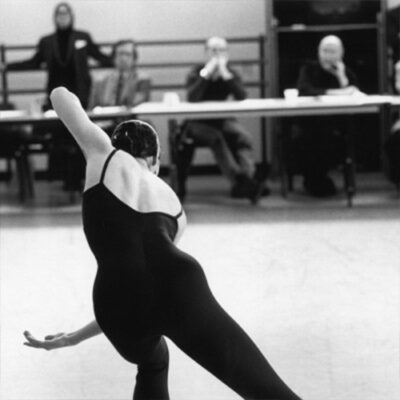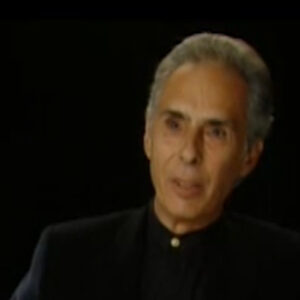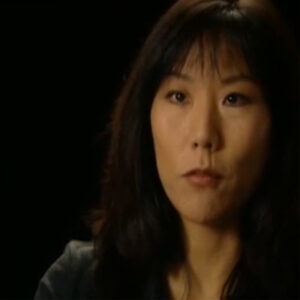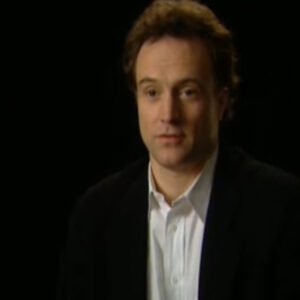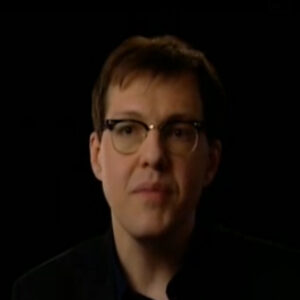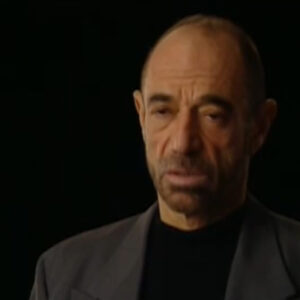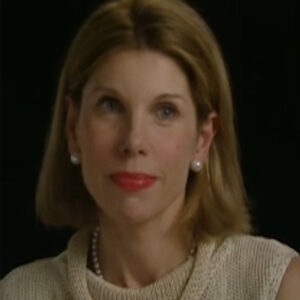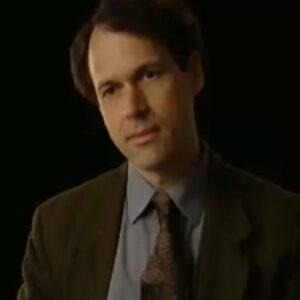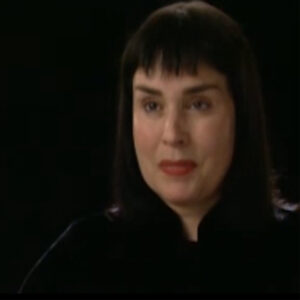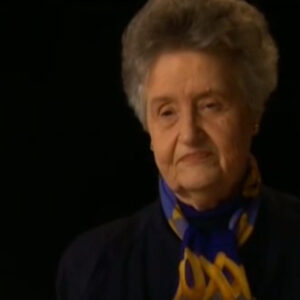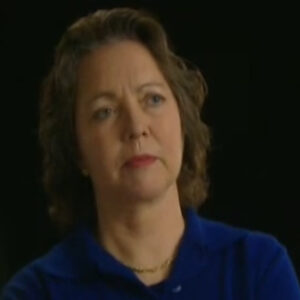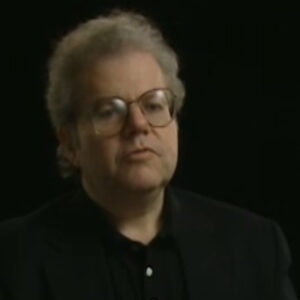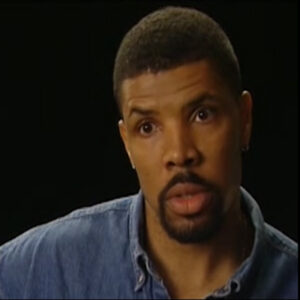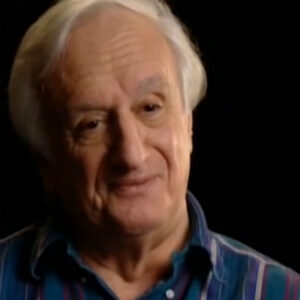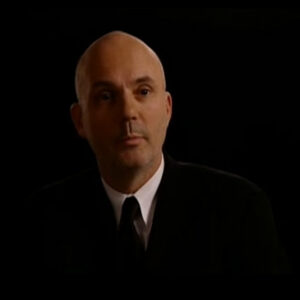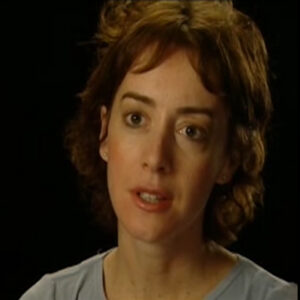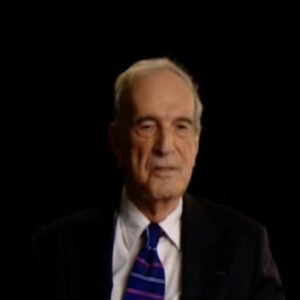Speaker I had gone to performing arts high school, where you were every term or every year evaluated as to whether you were on probation.
Speaker So you’d remember you. You were afraid you were going to get the letter.
Speaker The letter which told you that you were on probation because you weren’t either talented enough. I never said that. But you people didn’t think maybe you’re going to be an actor.
Speaker And the fear that that created, I always remembered from high school. And I saw that early on in at Juilliard, that if you were worried every year whether you’re gonna get thrown out, you really couldn’t have a safe place to work.
Speaker It might motivate you to work yourself to death. But it certainly wouldn’t create a situation in which you felt free to fail. And since you’re always saying to students, you must feel free to fail. Failing is what how you learn. You can also say, but if you fail too much for go through at the end of every year, it just doesn’t work out. Plus, the fact that the first year of Juilliard is very difficult, one for a lot of people. They come from small towns all over the country. They haven’t been in New York City, which is already a sort of major shock for people. I mean, just to get used to a big city and one like New York, which is not only Fast and Furious, but also has a lot of distractions when you are 17 years old or 18 years old that perhaps you’ve never had before.
Speaker So to also have over this, the fact that if you don’t do well the first year you get thrown out. I felt was really counterproductive to the training. So we got rid of any letting go in the first year and said we would do it. And we finally got to the point. And this is something that when I became director, I sort of insisted upon it that it would be once at the end of the second year and they would get a warning by Christmas time if they felt if we felt that they were not adequately advancing far enough and they would have quite a few months to do something about it and then be re-evaluated at the end of the second year, because the third year in the fourth year, people are expected to know quite a lot of basic things.
Speaker And if you haven’t really, you know, made those certain basic things in terms of your technique or or a way of working yours, the third and fourth year are going to be very difficult for you.
Speaker So now it’s in the second year. And I’m also very pleased to say that, you know, we don’t take in now any more than 18 or 20 people with the assumption that we’re going to keep every one of them if it works out that we could. We’re happy to have a graduate, 20 people, if that’s the case. So that that’s all gone. And while we do two evaluations, second year after that, a person would only be asked to leave if their cuts are cut classes or for disciplinary reasons. And I think that’s changed the atmosphere considerably.
Speaker And did you see in your in those early years, you know, incredible devastation, people cut cutting away was so routine that in a way, I heard everything from Kelsey Grammer saying, oh, you know, they tell me to go.
Speaker And I was like, OK, you know, Eric Lascelles saying, you know, The New York Times was the biggest devastation in his life. Right.
Speaker I, I don’t make light of the devastation part of it, because I think that, you know, if you thought you want to be an actor for a long time and then a bunch of people say they don’t think you are or this is the wrong program for you, I, I, I think it could be quite devastating. Most people survive. They’re, you know, famous stories about all those famous actors. Alec Guinness being told he couldn’t act at acting school. I mean, everybody has stories like that. But when you’re young and and and you’re told that it’s tremendously painful and I know we all and faculty hate doing it is probably any any school will tell you how painful it is for the faculty. And and so I know how painful it is for the students.
Speaker In some cases, you think this is for the best because they have made the wrong choice in their life or this is truly not the right training program for them, or they simply didn’t do the work, at which point they have to take some responsibility for it.
Speaker But did I see incredible devastation?
Speaker You know, people react to things in very different ways. I’ve certainly talked to students who didn’t stay. I’ve hired P I hired Kelsey Grammer. How? After he was taken out of school. It’s such an individual thing. But not all schools are for. Not not all schools are for all people. Certain people thrive under one kind of training. Certain people thrive on another kind of training. And sometimes also you can make a mistake.
Speaker You know, you can think somebody has something and they don’t quite have it. And it’s a mistake for them to stay doing it. But it’s I’m very pleased now that we’ve taken so much, so many fewer actors that this is not nearly the issue. It used to be nearly.
Speaker Well, we when we were talking about in the audition process, you actually said at that time in your office the idea was to take as many people as you could train. Intention is to train them. That’s right. If they leave, it’s just whatever.
Speaker Yes.
Speaker I mean, I also understand when somebody decides that Juilliard is not the school for them and sometimes people are so anxious, so ready to just that they shouldn’t be students. They should, I guess, just go out and act, you know, they just shouldn’t be in a training program. And I completely understand that, too. I believe the world needs trained actors. I mean, that’s I think that’s what and that’s what actors need. So they can be actors. You know, you want to be an actor when you’re not so cute anymore, when you’re not so pretty anymore, when your basic sort of adorable qualities go, you want to be able to age in this profession.
Speaker You want to be able to not be forced to be typecast because you yourself are typecast yourself. So training really can help help an actor have a career for a lifetime. And I think that’s really important. But some actors, it’s just not the right thing for it.
Speaker What do you think that this is just a side question?
Speaker What do you think that people used to go for?
Speaker They don’t. And you look at the last five years, is it isn’t that the trading change or is it a way? Is it so competitive that once you’ve done three years at Juilliard, you just don’t miss that fourth year where the agents are going to see you unless you’re miserable or insane? Or is it because there was a competitive level change, so much sort of that sense of being free to do that?
Speaker Quite a few people, you know, 10 years ago or 15 years ago would voluntarily leave.
Speaker I mean, why fewer people do it now? Really fewer people. I mean, I can’t imagine any of these people voluntarily leaving. And I don’t think they really see a lot of voluntary departures in the past five years.
Speaker I’m not sure I have the answer to that, although I may.
Speaker This there is greater competition in enacting than there was. There are more schools. There are more young actors entering the profession. Sometimes I despair of the fact that, you know, there’s so many drama drama programs in schools, many of which, you know, shouldn’t be. I’m not talking about the major conservatories now.
Speaker And the agents aren’t so eager to sign somebody until they’re really ready. And so I think actors are probably not being wooed out of school so much by the agents as they used to be.
Speaker I also think maybe because there are fewer students in the school and people having more attention that they know they’re getting more out of the fourth year.
Speaker I think, though, that they it seems when you look at the leagues, I mean, very few people walk away without an agent. I mean that from Julia. I mean, I’m working on this movie, I had Asian friends and casting Asian friends who were saying, you know. Give us.
Speaker Well, I think Juilliard has a very good reputation of of of developing actors with skill and and so agents, I think are very favorably.
Speaker You know, favorably think about Juilliard actors to sign them. I wish agents would pay more attention to the lifelong career of actors. One of the things that’s disturbing me at the moment is that actors leave Juilliard. They’re trained to do all kinds of plays and then they sign with agents who tell them not to do theater at all. And I know that’s an economic issue for the agents more than it is for the students and. Now, I’d like to train the agents. I’d give up training actors for a couple of years if I could get a bunch of agents for two years and teach them about what it means to be an agent and try to make some artist career for their life instead of for the next two years while they’re still, you know, an agent who are juvenile.
Speaker Talk a little bit about, you know, because obviously we’ve gone through several phases of your own acting class, I mean, this, you know, as you can imagine, it wouldn’t be the first time you’ve heard it.
Speaker Many people will talk about the third, your acting class as a kind of a pinnacle moment for them in terms of the work that they did. That’s just continually coming back to them and say, you know, to work later on in their career. I mean, in terms of this, this this what’s going on in this sort of thing.
Speaker Third year that I love teaching, third year acting. I mean, I enjoyed I freely enjoy teaching. And I would say it should for three years, four hours a day. I enjoyed starting actors, but now in my life, I actually find that what I’m best at and most valuable as a teacher to the school, in addition to being the director of a school, is putting. Two years worth of work together in the third year, partly because I think I’ve learned through all these years of teaching and also directing that I do understand an actor’s instrument. And I think I’ve learned how to help an actor unblock themselves. And yet at the same time synthesize the work they’ve been doing. I also think it’s a very individual process. So I try to understand each actor in the way they work.
Speaker So they are ready in the third year to take most of them some big leaps forward. They have enough. Information, they have enough basic skills, which is why I think we decide to re-evaluate people to enter the second year. They have enough basic skills or even better than basic skills. They have some confidence in what they know. They have some genuine desire to change what they know doesn’t work. By that time, because they’re not so confused and.
Speaker I’ve been doing it for a long time, so I think I actually have a way of working now that. Connects with the students. Now, I’ve learned a huge amount from teaching wonderings, I’m still teaching after 27 years of Juilliard while I was, you know, still I’m running a theater is because I continue to learn in class. I’m now fearless. I think I can just hope I can spot where there’s a where an actor is going along and then something happens. I hope I can deal with that moment and and freedom to go on.
Speaker Or I can remind them of stuff I’ve taught acting in the first. And I know what the second year actors. I can remind them of things that they’ve forgotten along the way. When they get to the third year and they’re ready. They’re ready. They’re ready.
Speaker They’re at some school experience. They’ve had some life experience.
Speaker Wait two seconds. Billy, tell us about that now.
Speaker Which I never used to be. I mean, I, I, I remember when I first started teaching, I thought I better spend the first two or three weeks getting to know them. And now I think, no, let’s just go to work. You know, let’s just go to work. And I work a lot more in class. Now, I used to say go home and do this, and now I think. No, no, no. That’s working class out of work with you right now. And that’s part of this. I’m directing so much also. And that’s kind of how I direct. But I. I tell you, when when a class such as this class this year, this third year class is as cohesive, as supportive of each other, as ambitious to grow and bring in as much work as they do. I find teaching an absolute joy, an absolute joy. I don’t always I mean, if people aren’t working or, you know, they’re lazy or somehow they’re afraid to work for each other because they’re not supporting each other and teaching is hard.
Speaker But when. The atmosphere in the room is about getting better and discovering problems and trying to solve problems instead of being defeated by them.
Speaker It’s a wonderful experience and I think I keep learning and I keep reminding myself because I love actors and that’s for my days with actors. I mean, if it’s not Judy, I’m in Washington.
Speaker So that’s you know, that’s who I. That’s who I see all day long. And and so I I’m always amazed by.
Speaker By the courage that actors have of not just getting out there and being willing to be criticized or whatever it is, but also of the. Continually desirous of giving those parts of themselves that.
Speaker Maybe are not the nicest parts, not the prettiest parts, not the most sympathetic parts to actually reveal more and more of themselves, and I find that so courageous. And I also find that so. Generous. You know, I there’s such a myth about actors being eccentric and actors being stingy and mean spirited and but just the very act of getting up on stage and illuminating another person or revealing something of yourself to people you don’t know who might reject you. It’s such an act of generosity. And I, I, I really admire and respect that. And I respect and admire that and students as much as I do and in and professional actors. And so I.
Speaker I encourage students to do more of them, to reveal more of themselves, to illuminate more things, to go places that they’re scared to go.
Speaker I think that an actor, when you get out in the world, everything else will tyrannize you. You know, the society will tyrannize you by telling how much money you should make. The casting agents will tyrannize you by telling you who you should be onstage. What what’s the limits of what you can do? The plot, the you know, the director, Mike, tyrannize you by having a lousy concept. The playwright might tyrannize you because not by not knowing how to write a scene. Well, who knows? So the one Taraneh that you mustn’t have is the turning of yourself.
Speaker You mustn’t have your own fears to control you. You mustn’t have your own wanting to have an image control you. So I spent a lot of time in getting actors to break the chains of their own tyranny so they can have the guts to survive and combat the attorney from outside.
Speaker And that’s what I hope. Third, your acting is.
Speaker Well, people have talked a lot about this sort of process in the first two years of being sort of, you know, strip fair.
Speaker Yes. And can they. And that and they said maybe I did.
Speaker Maybe not true. Some people feel like, well, some people simply don’t survive the stripping. They can’t bring back whatever that initial spark was.
Speaker I mean, I think the first year of Juilliard, like most other training programs, is getting rid of your bad habits, which may appear to some people as being stripped bare.
Speaker You know.
Speaker Most young actors come in, what are they done, they’ve been in high school. Maybe they’ve been in college. They’ve done some plays. They’ve been the most talented person in their class. What were their plays? It was play practice, probably more than rehearsal. Probably the biggest direction they got was go faster.
Speaker They pretty much invented it on their own.
Speaker They’re talented, but they probably push for results too quickly or they indicate very badly or they characterize whether broadly or they think acting is emotional or they can’t win. It’s not really there.
Speaker They push a variety of things. So. So. There is very often an unhelpful idea of acting when somebody comes in with a very talented person.
Speaker It doesn’t mean that it’s incorrect so much as if it gets in their way. If I’m trying to give my performance before I’ve built any foundation for it, that gets in the way. I’m not really investigating. So you have to take the student to a process of getting rid of a sort of accumulation of bad habits that they’ve picked up very often without any knowledge that they picked it up. So that may seem like stripping bare.
Speaker I don’t think that’s the best description of it, though, because. It’s just, for the most part, getting rid of stuff that’s not useful in the long run. And sometimes if that’s all you’ve got besides talent, it seems like you’re left with nothing. By the third years, what I’m hoping to do is to to. And also it’s put put a lot of things together. But also some people for whom acting has been fun and not a craft find the discipline of creating a craft. Very. Unfun. And and the difficulty, I think, in a school is to balance keeping the creativity going. While the difficult task of creating a technique. A process happens and for some people. You know, starting to try to figure out what it is to act seems to destroy what they consider their spontaneity.
Speaker But it is a craft and it’s supposed to last you for your whole life. So you have to know what you’re doing.
Speaker Well, there’s also this issue of taking the technique of taking this better voice, this better body, you know, and having the ability to bring yourself and your natural your ability to get back to it.
Speaker It’s also I mean, yes, you can stop acting for a minute if you’re just right.
Speaker You know, even once you’ve learned that, you’ve got to bring back acting. Right?
Speaker Well, I’ve always said that and that the best acting that the Juilliard students do is in their fifth year when they’re out of school. And I’m a big beneficiary of that because I’ve heard a lot of Juilliard students checks with their in Washington. And it absolutely fascinates me that once they’re out of school and they’re not being looked at as students at all, they can put it all together in a really terrific way. And even the rep when we come back, when I did Duchess Mafia a couple of years ago, when we did it in the fall, it was fine. But by the time we brought it back and the rep in April, pretty much when they were already had agents and they were all ready to go out, the ability to do the play was on a percent better.
Speaker And that’s a measure, I think, of worth of the training, that it finally is most valuable when they’re in the profession where they’re no longer being watched by their voice teacher and their movement teacher or by me. But they are now joining professional actors and they they they can use that stuff. And, you know, an actor, they say an actor keeps growing. And I believe that it takes 20 years to make an actor. Well, it takes, you know, four years of training and 16 years of work and 20 years of life for it to really take.
Speaker And how do you counter the classic line of someone going to the audition, hearing that voice and saying, you know what I mean? I mean, this sort of cliche, I think that everybody wants to.
Speaker I think there I think there is a perception that Juilliard students are so vocally well-trained that they are vocal actors or that they have, quote, a Juilliard voice. I think all the voice teachers will say that your voice is supposed to be so flexible that you can.
Speaker A lot of things with your voice and that you don’t have to sound the same way when you’re doing one play to another, one kind of play to another. But I think when when there is so much. That an actor has to go through to develop their own best voice, because most of us don’t use anything approximating the best voice we have. I mean, most of us talk just, you know, from our throat or resonate with drug use, our resonators or whatever the issues are. We don’t support it. That when you start learning about that, they tend to exaggerate. And they tend to try to imitate, you know, a certain kind of sound. Eventually that goes away. But I think when you are a young actor, maybe just getting out of school, that when you’re. When you’re a little nervous or when you think you’re being watched, you may tend to go through to your idea of what it’s supposed to sound like. But actors must have flexible voices. They’re not supposed to have to talk the same way in a realistic television show as if they’re doing it. Thelma. That’s not the idea. And one doesn’t expect them to. I also think that.
Speaker You know, decent, decent, clear speech is not necessarily funny, but there are a lot of plays written now where people don’t want, you know, such precise diction and so you just don’t use it. That’s the whole idea is I don’t think anybody is trying to send anybody out saying now this is a Juilliard student. I certainly would respond very badly if I thought that was what we were doing.
Speaker Well, let’s let let’s talk about also about this controversy. I mean, we’ve talked about it off camera. I mean, from from the Steven Henderson’s of the world move with this.
Speaker When the school began, I went when the school began, I think it didn’t take into consideration.
Speaker The problems of diversity.
Speaker While I think the directors of a school. Admired, talented actors of color.
Speaker I think they thought that. You know, it’d be all right if just people were talented no matter what. And that there was not really any.
Speaker Thought given to what are the issues that African-American actors have? That might be different than Caucasian actors. The repertory was all white. The faculty was all white, came out of minority students in a given class, might be one.
Speaker It pretty much looked like the American theater of the time.
Speaker As a matter of fact.
Speaker And. If I was an African-American student at that time, I would have been quite unhappy, actually. I would have thought I got pretty good training, but I would have thought I was very much alone, that I only got to play certain kind of parts.
Speaker I never got to play a part of a person my own color. There wasn’t any repertory that I could connect with other than the White Repertory Classic repertory. And I would have been. Unhappy? I might have gotten some huge parts.
Speaker But they wouldn’t have been discriminated against. I don’t think for parts, but I would have felt that the school itself was discriminatory, even though it may not have thought it was.
Speaker Now. I. Because my whole life I had been casting.
Speaker Actors of color in major roles in my career since the beginning of my career, partly because I started with Joe Papp, partly because the best actress I knew was Diana Sands at the time, I, I always. Had a large percentage of minority actors and companies. I wanted to work with the best actors I could could have. So one of the things that I felt very strong about when I was astrocom director of the school was to make it.
Speaker A good place for actors of color’s color to be my own agenda was that I wanted more actors of color to be willing to work with me in in Washington. But.
Speaker I I felt pretty strongly that we had not done a good enough job. And one of them was to increase the number, just the number of actors of color in a class so that nobody felt I was the token black or the token Asian or. And so that scene work could be we could do scenes from August Wilson, we could do, you know, scenes from other writers of color also. That allowed us to change the repertory. So from the very beginning, in the first year, we were doing plays by a black writer or plays with, you know, characters who were black or Asian, American or Hispanic.
Speaker And that there should be really qualified minority faculty.
Speaker So I’m very pleased that I think it’s a very good place now for young actors of color to be.
Speaker And that’s actually shown in, you know, in who applies now. But. And that’s totally embraced by the school.
Speaker You know, the world’s changed in 26 years. And Juilliard, luckily, has changed with it. Also, the biggest issue was speech. That’s why Eric was thrown out. And that was Liz Smith.
Speaker And that’s going to I mean, Robert still thinks that any kind of black speech is really bad. But the thing is, is that there’s a way of there’s a way of there’s a way of teaching a black actor now, a kind of good standard speech without saying this is the only way you can talk for the whole rest of your life. And we’re actually beginning to teach it as a dialect. But that’s the way rethinking the whole idea that you don’t have to give up your entire identity to come to Juilliard, you know, because we’re all not trying to be English actors from 1940. If you remember that John’s ideal of an actor, Michael’s idea of an actor were from another period.
Speaker And we’re a different generation.
Speaker Some people think that’s a lowering of standards. I don’t think so. I think that is a more realistic appraisal of what an actor is like in the beginning of the 21st century.
Speaker Well, did you feel that back with you, you know, in trying to get together and talk to people and talk about things that you just did? Well, no, I never thought about that. Yeah. Yeah, well, I think.
Speaker Yeah, I think there was some consciousness raising necessary to do as it always is when you change, you know, ideas in any institution or any training program.
Speaker I think there was issues of sensitivity awareness that were necessary to discuss it or to bring up. I think that’s one of the good things, which is that things would come up and we would discuss them and we could be very frank about it.
Speaker We thought people were not being sensitive to issues of of race or education or things like that, you know, without I hope, you know, just being politically correct and and sort of caving into a kind of general low level of competence, which we all believe in. This is a great art. But, you know, when you look when you want a lot of disparate people to learn to work together and and grow together, there is often a need to confront difficult issues.
Speaker Well, it’s also there’s an incredible responsibility that you have a legacy, what Giuliani is now built. And also at the same time that it’s about the students and it has to do with it. It’s also all of your lives. I mean, it is your professional career and it has huge meaning to you as well. What I mean is, as we were saying in the other day, don’t rely on don’t talk about a student’s success being a mirror of your own success, but what you do, how you are all working. It must be this sense that students have that they’re functioning in a void sometimes. Have they noticed me? You’d be surprised always when you’ve come around to being a faculty, which I have to. How much you are going to say, how much you are thinking about this money feeling?
Speaker Yeah, I the thing that’s been constant and and which I’m even more aware of now that I’ve been the director of the program is how much actually personal commitment the faculty has to the students. How I mean, I’m I’m always so impressed when we have a faculty meeting to talk about with the director of a project to talk about the students, how well understood the students are by the faculty and how much they can share with each other about them. That may not always get to get to a student because you think often you’re just communicating by working with them when you work with them. But it’s it’s the perceptions are really quite are quite terrific. And the sharing of what to do about somebody who’s having trouble here or there is actually also terrific. But I you know, I also believe very strongly that while teachers are very important and we’re important guides or facilitators, a lot of what the actor does is train themselves while they’re at the program that a lot of it is has to be self-motivated and. And the best results are those students who not only take from the faculty, but then also incorporate and teach themselves, and that’s that’s tremendously important that I encourage all the time.
Speaker I say you don’t have to agree with everything we say. Try it. Try it. You may throw it out some day. It may lead you to something better. I’m the product of some terrific teachers. I don’t teach like those teachers. I am a product of those teachers. But I have synthesized it and made it my own and do something else. I expect someone to do the same thing with what I give them. Take what you can use, discard what you don’t want, and turn it into something new for the time you live in and the person you are.
Speaker When that happens, I feel very satisfied as a teacher because then I know that person has a way of working. That’s for them and that’s all. That’s all you want is for someone to be able to eventually have a process that they can count on. And the freedom and courage to dare in any situation. And that’s what you want. And they have to develop that with your help themselves.
Speaker I think we have to work with you.
Speaker I have a will because we follow so, so closely the audition process. I do want to talk a little bit about what that what that process is. What what you know, what you’re I mean, it really is it is a is a window there that I don’t think people have seen at all, really. Especially, you know, it’s like going to someone’s Harvard interview. I mean, it’s it’s a very neat thing to sort of see in terms of I’ve just I mean, the energy everyone was bringing to that room is not surprised.
Speaker Surprised people could frankly be so, so ballsy at times and change. I would hardly have sat down and asked you if you knew James Dean off the record. But, you know, you take it. I don’t have it. What are you looking for in the audition process and how that changed? I mean, you still seeing that the crazy Mary Lou risottos that gets splinters down their path, which is what she said happened to her?
Speaker That’s true. So it was the moment I literally had to go. She did. She did.
Speaker She tell me the heart and bravery in that level changed.
Speaker I think if anything has changed in what we look for in the audition process from when this all began is that we probably do pay somewhat more attention to the actual work in the audition monologues that I do look for an actor who can make someone else’s words their own seem to be for that little bit of time, living some part of the monologue.
Speaker And with Shakespeare, it’s not a question of how they speak it or whether the verse makes sense, but whether there is some connection, untrained, but connection between language that’s almost 500 years old and the person speaking it so that that is the pieces they bring in or the extra ones that we ask them to do some is and the callback probably have more weight now than they did twenty six years ago out of experience of bringing people in who might have looked terribly interesting when they threw themselves on the floor, but maybe when they had to say somebody else’s lines were really very far away from it.
Speaker I think courage, imagination, physicality, all of those things are still important. Still very important, but I think I also listen harder to the pieces they bring in to see whether this person has that ability to make their own something that’s essentially not their own. And that is a very important part of an actor’s.
Speaker Ability and.
Speaker If somebody has that, they’re very good to work with right away and the conversations that go on upstairs are just at that moment of insight. Where is this person? Does a person.
Speaker How old. Yeah. You mean the conversations? The conversations. You mean of the people who were called back upstairs in the office?
Speaker It’s a pretty fast and not necessarily totally efficient way of trying to get some sense of the person’s personality, some sense of the person’s goals, whether those goals make any sense within as ambitious and rigorous training program as Julie are a little bit about their.
Speaker Sort of vision of of of artistry and. And something about their honesty. You know, their ability to connect with us or we with them without too much in between.
Speaker It’s late in the evening. They’re usually quite tired. So, you know, it’s not they don’t need to sell so hard by that time. They’ve actually gone quite far.
Speaker They don’t need yet one more, you know, sales pitch. So they’re usually more relaxed and and and more just willing to be there.
Speaker And that’s actually very helpful to see them. It’s only 10 or 50 minutes. So it’s you know, it’s probably not enough, but it’s helpful.
Speaker Do you find that it’s. Hard to fill the class or hurt people sometimes.
Speaker I mean, people, I imagine, would save you all the time. God, how can you choose? You think, well, you know, anything happened in the room and three people that got they got in I saw in that room just by getting hot bathtub. I mean, you can see it. You know, there’s something going on for people.
Speaker You know, admission processes are at best a terrible way of trying to find out about actors. It’s it’s not enough time. It’s it’s it’s it’s always an unnatural situation for the person who’s auditioning. And it’s a reasonably unnatural situation for the person who is watching the auditions. You’re trying to make an awful lot of decisions awfully quickly based on not a huge amount of information. But. We know what the program is, we know what the expectations and the needs of the program are.
Speaker Sometimes it’s hard to narrow it down to, you know, the 20 or somewhat people that we take. Sometimes it’s a little hard to find, really, those 20 people that you absolutely believe in and want to spend the next four years with. It is like, you know, not a marriage, a marriage at least more than four years. But it is we’re going to spend days, you know, days for the next four years with each other and.
Speaker And. That’s that makes you think very carefully about. About whether that person is the person that you should be spending the next four years of your life with. We see an awful lot of people. I think a lot of people come to Juilliard thinking it’s, you know, maybe I like college or maybe they come because knowing some famous, you know, actor who went there and so that they wouldn’t that be fun to go to.
Speaker And so they’re really not ready to enter into a conservatory. Probably should be going to college, a liberal arts college with maybe a drama program, which they could take as an exit Crigger activity, but they should be getting an education and they should be becoming more mature as people before they actually decide about this. So there are a lot of people who come here. You think that it would be better if they went to college or come back and see it some other time or maybe this is not right now a profession that you should be in. It’s when it gets down to those people who are qualified that you have to sort of start thinking about those particular qualifications.
Speaker And I’m thinking of a life the whole, you know, not feel cast or the cast.
Speaker You know, you get a problem with a cast of Roswell as is. Where are they going to be when they don’t look like the cast of Roswell anymore? That’s that’s for me a very big issue, because so many so there’s so much youth, so much young acting going on right now because this big youth market. And so there are a lot of new faces, a lot of pretty new faces. And I think a lot of them are charming and some of them are good. But will they still be working when they don’t look like that anymore? And that’s why you need a technique and that’s why you need a craft. So.
Speaker And that’s why I think you need to hear.
Speaker But you can ask me another question, what about what about people, people?
Speaker What which you don’t do? What would be the what would be the what about the interesting thing is that if somebody who had a life, who wants to be a character actor coming in and coming from 30 to 34.
Speaker We we don’t have an age limit. We have actually taken one or two actors who who actually are 30. But it is four years of your life and four years in which you will also be acting with 17 year olds and 24 year olds. So it has to be a very specific kind of person who could endure that and flourish in it. Now, if somebody came in that that seemed to be quite clear that it would be good for them and they’d be good for it. I think we would consider them. And I think we have.
Speaker But most the people who would come to Juilliard who are over 30, it’s most people who come so far, it’s not a training program.
Speaker They need they they just haven’t gotten work and so feel somewhat lost in their career. So it really hasn’t been a very big issue as to whether we would take somebody who clearly would benefit by, in a sense, starting all over again at an older age.
Speaker It’s even hard now, I think.
Speaker I mean, Charlie Charles was 30 and and and Kelly is, you know, 30 when she came in the first year. So.
Speaker And Jasmine is, you know, and they’re having some difficulty, but, you know, don’t. But it depends.
Speaker I mean, we’re you know, we’re moving much further up in age. I mean, it started out as a 17 year old school.
Speaker We take much, much less 17 year olds. We want people I think we have some some life experience as much as anything else. And some and some ability to handle the difficulties of a school like Juilliard.
Speaker Well, I think that my last question before you tell me about your dream right now, you’re not getting away without that.
Speaker I think you can’t use the story if I tell you that how the school has changed. You can’t use the store. I know that’s where you won’t use the story. But I’ll tell you, the of schools change. Edith Skinner, who was you? You haven’t heard the story yet. Have you got a story? She’s the most of this group on strike.
Speaker She was the most, you know, famous speech teacher of her time and talked rather like, you know, Eleanor Roosevelt talks of a famous teacher of actors anyway. And she wore she wore hat and she was very good. You’re not gonna have used a stroke as he’s making noise anyway like this.
Speaker Could you just stand up and help this fellow in any way?
Speaker She heard that one of our first one of the second year students, you know, we’re just going to leave that there.
Speaker She had one of the second year students had caught gonorrhea.
Speaker All right. We can’t say no.
Speaker That’s why I tell you this story. I sneakily hoping you’re not an object.
Speaker Caught the clap. And she heard this. And so when he turned in his speech paper that day, she put on gloves and took it from him. Now, those days are over.
Speaker Well, they felt like, oh, one thing we must talk about that I forgot to talk about, that’s important because I want you to leave this political I mentioned ever so briefly. But like, you know, the fact that also in 68 coming to New York, you were you were dealing with incredible outside political. You already know that it ended up revolting, if you can place for me, because I have the fabulous footage of what became the lie down on Lincoln Plaza.
Speaker I don’t even remember the lie down on Lincoln. Huge. Everyone put on blackface.
Speaker It was all Vietnam and all the people in housemen himself. And there was I mean, it was it was it can’t take state protest, Kent State protest. You know, remember it. You didn’t lie down yourself.
Speaker Well, I was doing a lot of stuff, I was doing a lot of stuff in those days, but I, I, I wasn’t part of the light down that I must have been at Stratford. But to some degree, my guerilla theater on the Lord with Jamie Crundwell sorry.
Speaker Where there to some degree, if you can sort of also talk about.
Speaker Well. Well, Judy, I began in the 60s during a large time a student protest there.
Speaker My memory of Juilliard, though, was that it was reasonably, reasonably apolitical for a long time until some really big event would happen and then the students would be motivated.
Speaker That’s my memory.
Speaker And sometimes it was disturbing that it was that way. But they were so busy being actors, however, with really big things happen, they would respond. But, you know, I don’t it it wasn’t like SS. It wasn’t like SDLC at Columbia. It wasn’t.
Speaker It’s a matter of fact, I think we talk more about politics now and what it means to be both an actor and a sort of responsible citizen than we did then. That’s my memory of it, cause Lord knows, I was doing anti-war plays on Broadway. So I don’t I don’t remember the school. Me.
Speaker Hotbed of politics. You remember that. Do you get anybody to talk about that?
Speaker No, I did. What did I forget? Well, it wasn’t a hot that, wasn’t it? I seemingly hope. I mean, very lucid. She remembers not doing a lie down. She thought that your husband wouldn’t like her anymore. You know, although he was political and lying dead himself. But she remembers sort of feeling like there was a kind of a party who said I was too busy. You know, I care about my craft too much.
Speaker Well, I think that people, you know, people were so people were so school was very hard and people were so busy trying to be good at school that a lot of the outside world disappeared.
Speaker And I think that’s still one of the struggles of any training program that is rigorous and takes up so much of your life is how do you balance the real world and the world of your training?
Speaker I think it’s very hard. It may be one of the hardest things that a student has to somehow deal with. You know, do you have a social life? Do you fall in love?
Speaker Do you care about AIDS? Do you care about marches? Do you. And and yet, do you do have all the time to do all the work you’re expected to do and more and maybe go to the theater or maybe have a date?
Speaker I think the struggle between a real life and your craft is a struggle for the rest of your life. And I think it starts in a really big way. When you go to a training program such as Juilliard and how you balance it or you don’t.
Speaker It’s a real issue.
Speaker And last but not least.
Speaker But my last question is really about these sort of incredible importance, but we are putting the point that some really big parts of school, I’m the one who didn’t give it the big parts. I gave Mary Jo Negro the part she wanted.
Speaker So, of course, it stuck with both of them. Mary Jo was saying, you know, when when she and Kevin and Stier’s got there, everyone was like, I know, right?
Speaker We stopped doing that. We stopped doing that after our one because they weren’t any better. That was the first Robin being someone who was supposed to go back because he was in no way ready to be done. The first two years. Do you enjoy your comment to him about what you just did?
Speaker No.
Speaker You know, I’m sure I thought imitating beyond the fringe was truly a stupid thing to do. Sounding exactly like the rhetoric record, I’m sure I said if you’re gonna do that, you might get out of school, which he also was accused me of saying in his book, which in my mind that I believe I would have said as shock tactics that I would pissing in Brown Courtright no matter what. I could have said it. I truly could have said it. I wish I remembered. I said, it sounds like fun.
Speaker Well, I mean, there’s always those good lines.
Speaker Well, they remember. I mean, I remember every bad thing was said to me by critics. I don’t remember any of the things I said to other people. You know, I just talked.
Speaker Well, the importance of, you know, what we’ll call the houseman’s and even part your own original mission of the school about this regional theater that some people will say now we’re being trained for a theater that doesn’t exist anymore. Now, someone deeply involved in the theater in that way, who’s casting these people in this very thing that you’re trained for? I want some kind of response to this sort of, quote unquote, death of theater.
Speaker And let me say a couple of things about the issue of whether Juilliard is training people for what Juilliard trained people for or whether the theater that Juilliard is supposedly training people for exists. First of all, the theater that Juilliard was training people for 25 years still exists. There are regional theaters in every single city, major city in the United States of America. So that theater does exist. It hasn’t gone away. Broadway has changed. And the popular perception of the importance of theater has changed pretty much one for economic reasons, because people the difference in what you can make as salary and theater is so less, much less than you can make in other forms of media and entertainment that not only is it difficult for actors, but it is particularly difficult for agents because their bottom line is 10 percent of those salaries. And so they really urge that people do only television and movies. But.
Speaker I don’t think Juilliard is training people just for the theater. Juilliard is training actors. And if an actor has a craft in which they can transform themselves. If an actor has a body which not only is disciplined but responds to impulses, emotional impulses, if it has a voice that is able to express many different things and and let the emotion come through the voice or the intelligence come to the voice.
Speaker So there are is a wide range of expression and they have an imagination and can feel comfortable in all kinds of different written materials. You’re training an actor for a career in his art and it doesn’t really make any difference whether they do a movie and don’t use their voice, but have to be alive every given moment in a movie and have to track out a character because they’re not going to shoot it in sequence. And so they have to, in their head, have a sort of arc of the character or they’re doing television where they’re going to have to make not necessarily wonderful dialogue be richer than it is or play different characters so they can have a life past the age of 30. Then you are being trained as an actor. That is an actor’s life.
Speaker And that Juilliard is training it for and it’s Juilliard import.
Speaker I mean, this is this move from Juilliard, you know, has the right to remain sort of a high watermark. It’s not about going to play around.
Speaker You know, I it’s a reputation going back and forth about being you can talk about a certain level.
Speaker You know, you either think that you either think that acting is an art, that you have to have a superior knowledge of a craft to be an artist, that you can’t be free to express yourselves until you have all the tools, all the colors, all the paint brushes, all the crayons that you need to express yourself fully. If you believe that acting is an art, then you’re going to feel you need to use have every part of your instrument available for that art. And if you have that sense of that’s what acting is, then you’re going to feel the need to train your instrument as fully as a dancer or a painter or a musician does. And if you feel that, then Juilliard is the right school to think about going to.

